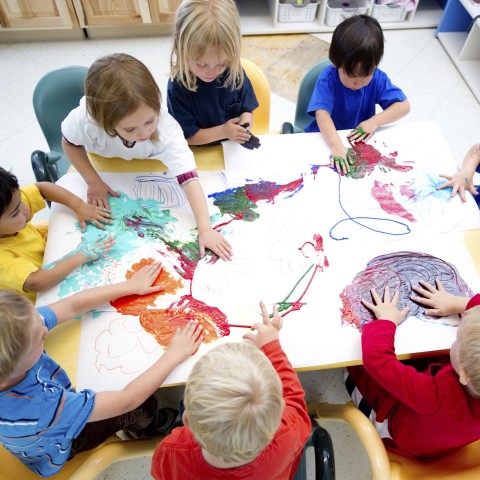Analysis: the German language contains a range of beautifully strange words that aptly describe a certain situation or emotion
By Sandra Aline Wagner, Mary Immaculate College, Limerick
Every language has its own reputation. While French is widely recognised as the ‘language of love’, German is famous for its long, convoluted compound words such as the much-loved and oft-cited Donaudampfschiffahrtsgesellschaftskapitän («captain of the Danube Steam Shipping Company»).
Some of these unique words have already found their way into modern-day English. Your kids go to kindergarten carrying their unicorn rucksack. You might enjoy a bratwurst (preferably vegan if you want to conform to the zeitgeist) at the summer barbeque. After this long pandemic year with international travel restrictions, you might be developing a severe case of wanderlust.
These examples demonstrate that the German language is much more than nightmarishly long sentences and difficult grammar. It contains a range of beautifully strange words that aptly describe a certain situation or emotion. Unfortunately for German speakers, the majority of these words cannot be translated literally into English. Here are 12 of those words:
Fremdschämen
Have you ever witnessed a stranger making a scene in restaurant that made you feel horribly uncomfortable and ashamed of someone that you don’t even know? Then you’ve experienced Fremdschämen («to be externally embarrassed»), a feeling of embarrassment for someone else’s foolish behaviour.
We need your consent to load this rte-player contentWe use rte-player to manage extra content that can set cookies on your device and collect data about your activity. Please review their details and accept them to load the content.Manage Preferences
From RTÉ Jr’s Mother Tongues, you’d be surprised by how many German words you already know!
Sturmfrei
As a teenager, you can’t wait for your parents to go on holidays. You finally have the place to yourself and you have sturmfrei («storm free»), the freedom to invite friends over without being monitored or disturbed by adults. «Sturmfrei» was originally used in military language to describe an impregnable fortress or castle. When it began to be used colloquially, it became a metaphor for a house safe from parental infiltration.
Pantoffelheld
The Pantoffelheld («slipper hero») is a husband who might act as if he is in charge, despite all evidence pointing to the contrary. An equivalent in English would be the «henpecked husband». The fact that henpecked translates into German as «unter dem Pantoffel stehen» suggests that these unfortunate individuals are «trapped under the slipper», the slipper, of course, serving as a blunt symbol of domesticity.
Feierabend
Without a doubt, the end of the workday is a cause for celebration. If your German colleagues tell you that they are having Feierabend («celebration evening»), they are not necessarily having a party that evening, but most likely just finishing up work for the day.
We need your consent to load this YouTube contentWe use YouTube to manage extra content that can set cookies on your device and collect data about your activity. Please review their details and accept them to load the content.Manage Preferences
From Wanted Adventure, 5 great German words that don’t exist in English
Luftschloss
If you win the lottery, you would buy a little island in the Caribbean and spend your days sipping beverages from a coconut and basking in tropical sunshine. Such unrealistic dreams are called Luftschlösser, castles made of air that deflate as quickly as they are built.
Zweisamkeit
Can you relate to that feeling of completion when it’s just you and your partner sitting alone on a moonlit park bench, gazing at the stars? That feeling is Zweisamkeit («two-getherness»): the harmonic togetherness of two people, enjoying each other’s company and left undisturbed. The word combines zwei («two») and the antonym Einsamkeit («loneliness»).
Verschlimmbessern
Yes, Germans have a verb for when you try to improve something, but actually just make it worse. The German comedian Loriot was famous for his sketches in which his character was actively verschlimmbessering («to improve-worsen») the situation. In Das Bild hängt schief, he waits for an appointment in a fancy, well-decorated room. He notices that one of the pictures on the wall is crooked and tries to adjust it (with disastrous consequences – he ends up completely destroying the room).
We need your consent to load this YouTube contentWe use YouTube to manage extra content that can set cookies on your device and collect data about your activity. Please review their details and accept them to load the content.Manage Preferences
Das Bild hängt schief
Kopfkino
When you read a gripping novel, you sometimes see the plot unfolding in your imagination like a movie being screened in your head. Germans call this phenomenon Kopfkino («head cinema»). The word can also be used to describe a person imagining a very detailed scenario that hasn’t yet happened in order to assess possible outcomes or to calculate future risks.
Torschlusspanik
You’re pushing 40, your biological clock is ticking, you haven’t married and no suitor is in sight. Maybe you’ve worked the same job for 20 years and still haven’t been shortlisted for promotion. You feel panicked, as if you’re running out of time. If this is you, you are experiencing a case of Torschlusspanik («gate closing panic»), the fear of not reaching certain life goals as you get older. Sometimes torschlusspanik can lead you to make rash and foolish decisions (like marrying someone you’ve only known for two months and then divorcing after a year). The term originates from the Middle Ages, where the city gates were closed at nightfall for security reasons.
Gedankenkarussell
Something is bothering you. Your thoughts return again and again to the same problem despite your best efforts not to think about it. Germans call this a Gedankenkarussell («thought carousel») when your thoughts are revolving around the same topic as if they were riding on a carousel.
We need your consent to load this YouTube contentWe use YouTube to manage extra content that can set cookies on your device and collect data about your activity. Please review their details and accept them to load the content.Manage Preferences
From Easy German, people in Münster describe the German word «fernweh»
Betthupferl
Although this one sounds a bit creepy, it actually refers to something sweet. The Betthupferl («bed hopper») are the little chocolates that you find on your pillow in a hotel room! Alternatively, if you are at home, the sweet snack you have before going to bed can also be called «Betthupferl».
Fernweh
After being trapped in lockdowns, we probably all suffer from Fernweh («distance ache»). It is basically the opposite of homesickness and describes the longing to be somewhere else, to travel far away and see the world.
Dr Sandra Aline Wagner teaches German language and literature at Mary Immaculate College, Limerick. She also works as a cultural journalist for OPUS Kulturmagazin and Sonah Magazin.
The views expressed here are those of the author and do not represent or reflect the views of RTÉ
These German Words Have No English Equivalent
If you’re interested in learning German, but need a break from your traditional German language lessons, then you want to check out these 16 untranslatable german words. You may not see these words in your average language learning course, but people do use them.
In fact, people even throw these words in casual English conversations. Probably without even knowing realizing that they reflect German culture and thinking. Still, there is no English equivalent to these untranslatable German words. That means that you’ll need to commit them to memory. Luckily, that won’t be hard with how unique (and sometimes hilarious) they can be.
1. Torschlusspanik
This word combines “gate-shut-panic” to illustrate the feeling you get when you realize that you’re suddenly getting older, and you don’t have much time left. And it doesn’t have to slip in at old age either. It is the sudden realization that you need to do something with your life because it will not last forever. It’s quite similar to the “mid-life crisis.”
2. Sturmfrei
You’ve felt Sturmfrei the moment your parents or flatmates left you alone in your house. It describes the sense of freedom you get at having the place all to yourself. It comes from the combination of “storm” and “free.”
3. Ohrwurm
Have you ever heard a song that you can’t seem to shake? It plays in your head over and over again all day long and you find yourself humming it or singing the words out of the blue? That’s an Ohrwurm or “ear-worm.”

Psst! Did you know we have a language learning app?
You’re only one click away!
4. Weltschmerz
Have you ever felt disappointed after reading a sad news story? Or maybe you walked passed a homeless person begging for change and felt a sudden turn in your stomach? That feeling is Weltschmerz. It’s knowing that the world will always fail to meet your expectations because of the prevalence of pain existing throughout it.
5. Backpfeifengesicht
If you’ve ever heard someone being described as having a “punchable face” then you know exactly what Backpfeifengesicht is. Whether its a coworker or a politician, someone with Backpfeifengesicht brings a deep feeling of frustration to the surface when you see their face.
6. Dreikäsehoch
Dreikäsehoch means “three-cheese high” or the height of three wheels of cheese stacked on top of each other. It refers to a child who’s very small. And it’s not a flattering term as it’s usually meant to tease someone or remind someone that they’re trying to do something they’re not quite old enough (or mature enough) to do.
7. Schadenfreude
Imagine working on a group assignment with several people and one person isn’t doing his share. Instead, he’s messing around and even making fun of you for doing all the work. But the teacher notices and fails him, forcing him to retake the course. The resulting smile that slips across your lips is Schadenfreude.
Coming from “Shaden” meaning damage and “freude” meaning joy, this word describes the feeling of pleasure at someone else’s pain. The word recently gained mainstream popularity even though it has been used quite regularly throughout artistic spheres.
8. Schwarmerei
Coming from “schwärmen,” meaning to swarm, this word refers to excessive excitement or enthusiasm. If you imagine bees swimming excitedly around a beehive, that’s the kind of excitement someone with schwärmen expresses.
9. Doppelgänger
This loanword is quite popular in mystery and suspense novels. Imagine someone who looks nearly identical to you but isn’t related. There are many such cases, especially with celebrities, where people look very similar to one another. The origin of the word comes from German folklore and means “double goer.” It describes a spirit or ghost of yourself that exists in this world. Supposedly, when you meet your Doppelgänger, your death will soon follow. Spooky.
10. Kuddelmuddel
Have you ever looked at a situation and thought that it was a complete mess? Next time, call it a Kuddelmuddel. This word describes a chaotic situation or frustrating confusion that doesn’t make sense. It originally meant “dirty linen” in the Low German. While it may describe a messy situation, it does have a pretty clean rhyme.
11. Wanderlust
If you’re a frequent traveler or someone who wants to travel, then you know what Wanderlust is. It is the desire to leave your home and go out into the world, taking in the sites and culture all while filling up your Instagram feed.
12. Kindergarten
Everyone’s favorite year in school turns out to be a loanword from German as well. The word comes from two words: “Kinder” meaning child and “Garten” meaning garden. Therefore, a kindergarten is basically a garden for children.
Initially invented by Friedrich Froebel in 1817, the idea of a Kindergarten was controversial. Froebel took a naturalist and philosophical approach to educating children, who up until that time, were left out of schools until the age of seven.
Froebel left out scripture and put boys and girls together (a controversial practice at the time) to learn and interact with the world. While it wasn’t until 1837 when the idea began to take off fully, Kindergartens are a widespread and common practice today. This word has become so common that it’s hard to see it as a loanword.
13. Poltergeist
The title to one of the most terrifying films created in the 1980s by Steven Spielberg comes from a German word. “Poltern” means “to rattle or knock” and “Geist,” which has many meanings, but a common one is “ghost.” The word dates all the way back to the 1500s and reflects the actions of a mischievous spirit.
14. Innerer Schweinehund
Do you ever feel extremely lazy even though you have assignments, workouts, and projects to complete? Then you’re experiencing the effects of your Inner Schweinehund which translates to “inner pig dog.”
15. Kummerspeck
Many times in life we experience struggle, heartache, and despair. Sometimes we work hard to overcome it. Sometimes we ignore it. And other times, we order a double cheeseburger with bacon, fries, and a milkshake to distract us from our problems. Kummerspeck is grief bacon and it refers to emotional eating and the excess weight we tend to put on when life throws problems our way.
16. Treppenwitz
Have you ever went toe to toe with wit against an opponent and stumbled to fire off a curt reply, missing your opportunity, and only thinking of a reply much later on? That feeling of finally coming up with a comeback is a Treppenwitz or a “staircase joke.”
These words are only a few of the many untranslatable German words you’ll discover in your language program. They illustrate how developing an understanding of other languages changes your world perspective. If you’re interested in learning more, then you should check out language learning with Optilingo for an effective way to become fluent in record time.
There are some untranslatable German words that need to be explained.
To be fair guys, the English language is quite easy to learn. This comes from the general structure of your language. For example, compared to many other languages you don’t have genders, there is just ‘the’. Also, the conjugation of verbs follows some easy rules compared to other languages like French or Spanish. There are more good examples, but let’s focus on German now.
In fact, the German language is much more complex than English, and several other languages. But, despite this fact, in German we only have around 300.000 to 500.000 words in our dictionaries and in the English language there are up to 800.000. So congratulations, you win. (But this isn’t the only interesting fact about Germany.)
Even though your vocabulary is so much bigger than in German, we are using words in our daily life that have no proper translation. And you can get excited because we will show you some really strong words that will make you sound more German than some native speakers, which is great if you’re planning to travel there!
We want to show you 10 words that you should know when learning German. There is no proper translation to English, but we will make sure you will understand what they mean.
And, the best for you out of this, those words are actually used in the daily language between native German speakers, so let’s get right to it, though some of those words can be hard to listen to in daily life.
Table of Contents
- German Untranslatable Words List
- Bonus: Are there untranslatable English words?
- Conclusion
Start with a bonus, and download the Must-Know Beginner Vocabulary PDF for FREE! (Logged-In Member Only)
1. German Untranslatable Words List
1- Kindergarten
Literal Translation:
Children’s garden
Meaning:
Kindergarten is a form of preschool educational approach that is based on activities like singing, playing, drawing and interaction and is the transition period in Germany between home and school.
Example:
A mother or father is preparing their 1 to 6-year-old child in the morning before going to work with a sandwich and a small bag with new clothes. On the way to work the parent is dropping off their child in the kindergarten along with other parents and kids. He or she will get back after work to pick up her son or daughter.
Usage In A Sentence:
A quick note before we continue that sentence patterns are an important aspect of the German language, so you may want to brush up before continuing.
Onkel fragt: “Franz, gehst du gerne in den Kindergarten?” Franz antwortet: “Ja Onkel, ich gehe gerne in den Kindergarten!” (Franz is here the name of the kid) – Uncle asks: ‘Franz, do you like going to the kindergarten?’ and Franz answers ‘Yes, uncle I like going to the kindergarten!’
This form of pre-school education is well known in a lot of countries and usually, they even use the German word to describe it. Did you know that kindergarten has a long history?
2- Geborgenheit
Literal Translation:
Secureness, security
Meaning:
This refers to a state a person is in as well as having a feeling or sense of security and well-being.
Example:
You are sitting on the couch with your husband, your wife or even with your family in your home where you always feel comfortable. You have this deep feeling of security, protection, peace, trust. This is when you feel ‘geborgen’ which literally means secure.
Usage In A Sentence:
Mit seinem Partner zu Hause fühlt sie sich geborgen – With her partner at home she feels secure.
The feeling of ‘Geborgenheit’ means just so much more in the German language than you can describe in one word in English. When it all comes together from protection, happiness, warmth, love, trust, peace and comfort, just then you can get into this state. It really is a strong word.
3- Sturmfrei
Literal Translation:
Storm free
Meaning:
Having the house or apartment to oneself, caused by the absence of parents or flatmates.
Example:
Your parents are away for a couple of days doing a vacation trip and you are alone at home, then you have ‘sturmfrei’.
Usage In A Sentence:
Meine Eltern sind über das Wochenende nicht zu Hause, ich habe sturmfrei. – My parents are not at home over the weekend, I have ‘sturmfrei’.
A suiting English equivalent would be the saying, ‘When the cat’s away, the mice will play’. This refers a bit to making a home party when the parents are not at home. Well, sometimes this might be the case, but in Germany young people just enjoy to be alone at home without their parents, at least for a while.
4- Ohrwurm
Literal Translation:
Earworm
Meaning:
It might sound a bit strange, but and ‘Ohrwurm’ is nothing else than the situation when you have a song stuck in your head.
Example:
You are having a road trip with your friends and in the radio comes to a song that you know really good and you like it. The song is finished and in the next couple of hours, you can still sing the lyrics of it over and over again.
Usage In A Sentence:
Ich liebe dieses Lied, es ist ein echter Ohrwurm”. – I love this song, it gets stuck in my head.
By the way, to fix this issue and you would like that this song gets out of your head, just hear the song completely from the beginning to the end, because this usually happens, when you listen to a song and don’t finish it.
5- Dreikäsehoch
Literal Translation:
Three cheese high
Meaning:
This actually has nothing to do with cheese or food. It refers to a child that is not really tall, that has literally the same height like three wheels of cheese stack on top of each other. Ok, there we have the connection to cheese. To be fair, everybody likes cheese.
Example:
A kid is playing with his uncles and aunties on a family meeting and it gets a bit wild. Maybe the kid says something that he shouldn’t have said, so the uncle or aunt will call him a cheeky ‘Dreikäsehoch’.
Usage In A Sentence:
Sei nicht so frech, du Dreikäsehoch – Don’t be so cheeky, you three cheese high.
Usually, this word is just used when a kid has a bad behaviour or is a bit cheeky (or should I say cheesy) towards adults.
6- Wanderlust
Literal Translation:
Hiking lust/hiking desire
Meaning:
It describes a strong desire to travel and leave your comfort zone that usually is your home.
Example:
There is no real situation when using this word. It more refers to a deep desire that you feel when you are closed at home and you know you should be out there exploring the world, experiencing new cultures and cities while meeting new and awesome people all over the world.
Usage In A Sentence:
Die Wanderlust überkommt mich. – The hiking desire is establishing inside of me.
This has gotten quite popular around the younger generation all over the world. People use it as hashtags on their Instagram posts and even a movie is now called after this old German word which is filled with history and passion.
7- Fernweh
Literal Translation:
Distance pain
Meaning:
This literally just is the opposite of homesickness and something similar to ‘Wanderlust’.
Example:
You are coming back from a long holiday and you arriving with your plane at the airport, grabbing your suitcase. Then suddenly, you look out the window of the airport and see how planes taking off and a feeling inside of you that wants to go back to the beach or mountains where you just came back from
Usage In A Sentence:
Ich habe Fernweh. – I have distance pain.
‘Fernweh’ is actually something very similar to ‘Wanderlust*, but you need to differentiate here a bit. While ‘Wanderlust’ is the desire to be in a place away from home and exploring new things and feel the experience, with ‘Fernweh’ you are more thinking about a specific place where you have been already.
8- Fingerspitzengefühl
Literal Translation:
Fingertip-feeling
Meaning:
When someone has a great awareness of situations and is good at dealing with people and reading their needs. When having an appropriate and tactful sense for situations.
Example:
You know motorbike races on big tracks with high speed? The driver sometimes looks so concentrated and they navigate those powerful machines around the corner, where other people would struggle to get a car around.
Those drivers have such a good feeling for gas and brake of their bike that you could say in German they have the right fingertip-feeling for the bike.
Usage In A Sentence:
Er hat ein echtes Fingerspitzengefühl beim Verkaufen von Autos. – He has a real fingertip feeling when it comes to selling cars.
Often this term is used for describing how people deal with other people, but it is much more than that. If you are going after a certain hobby or work that requires a calm hand or precision you also can have this ability.
It can be really hard to pronounce the word. But luckily for you, there are resources you can use to get some help with this.
9- Fremdschämen
Literal Translation:
Be ashamed for a stranger
Meaning:
To be ashamed of someone else’s behalf.
Example:
Imagine you made a new friend and you want to hang out at home with him/her for a bit and present him/her to your parents. Your parents come home and they try to be really ‘cool’ with your friend and they are doing things that are just not appropriate for someone with their age. Then you are ashamed about the behalf of your parents.
Usage In A Sentence:
Ich muss mich für meine Eltern fremdschämen – I need to be ashamed about my parents.
This can happen quite often to yourself and it makes you feel bad, but let’s be honest. It can be really funny seeing a situation when someones else is in it and I am sure everybody of us experienced this before.
10- Erklärungsnot
Literal Translation:
Explanation misery
Meaning:
The state of having quickly explained yourself.
Example:
Everybody of us surely can remember this situation when your teacher asked for the homework and you didn’t prepare anything.
You need to come up with an excuse quickly and everything that drops in your mind is ‘my dog ate my homework’. The word ‘Erklärungsnot’ exactly matches this emergency situation where you need a little lie or excuse.
Usage In A Sentence:
Er ist in Erklärungsnot gekommen. – He came under pressure for failing to give an explanation.
2. Bonus: Are there untranslatable English words?
But not only in German we have words, that you can not translate properly into English. From English to German it is also hard to translate some words. Some examples for you:
- Pimp
- Spam
- Bromance
- Googly
- Facepalm
3. Conclusion
Finally, it’s time to say thank you for your patience and interest in this. You learned 10 untranslatable words of the German language.
If you are interested in something even funnier, why not take a look at the 5 longest German words? Can you pronounce them or even find out what they mean?
Are you ready to learn the German language? Here at GermanPod101, we made it our passion to help other people learning this fascinating language. There’s plethora of reasons you should continue your pursuit of German mastery!
If you want to find out more and get more into detail with German, check out the resources we provided in this article. Until then, all the best without 10 untranslatable German words.
Start with a bonus, and download the Must-Know Beginner Vocabulary PDF for FREE! (Logged-In Member Only)
Last Updated on 2nd March 2023 by
One of the best parts of learning a new language is all of the interesting, unique, quirky and downright weird vocabulary that comes along with it! When it comes to German, there are plenty of magical German travel words that simply don’t exist in the English language (although obviously, we’re all wishing they did!)
I was raised in a bilingual household and have been learning new languages since before I even understood the concept of ‘language’. And one language that has always fascinated me is… German. A pretty logical language, it’s full of compound words.
Oh, and a quick note on German nouns: German nouns always (always, always) start with a capital letter- just a word of warning before you start thinking I was a little over-enthusiastic on the grammar front today…
Contents
- German Travel Words You’ll Wish We Had in English!
- #1 Fernweh (n.)
- #2 Gemütlichkeit (n.)
- #3 Kopfkino (n.)
- #4 Luftschloss (n.)
- #5 Sehnsucht (n.)
- #6 Sprachgefühl (n.)
- #7 Torschlusspanik (n.)
- #8 Waldeinsamkeit (n.)
- #9 Zeitgeist (n.)
- #10 Over to you!
- Enjoyed reading this guide to the best German travel words you’ll wish we had in English? Pin this article now, read it again later:
#1 Fernweh (n.)
Although there’s no direct translation for ‘Fernweh’ in the English language, the literal translation is ‘far-sickness’. Indeed, the word Fernweh is one of those compound words I was talking about that are so common in the German language!
You know those feelings of itchy feet, opening up every travel deal that finds its way into your email inbox and daydreaming a little too much about your next adventure during your coffee break? Well, the word ‘Fernweh’ sums up all these feelings and more.
If you were to translate Fernweh into English, then its equivalent would be ‘wanderlust’. Ironically, Wanderlust is a loan word from German which came to have a different meaning in English. The word was originally a German verb ‘Wandern’ (‘to hike’) and still means this in German to this day.

#2 Gemütlichkeit (n.)
Although this word is often translated as simply ‘cozy,’ the word conveys so much more than this, and would be immediately obvious to any German speaker. Gemütlichkeit is all about achieving the perfect balance between cozy, warm and comfortable.
When I checked the dictionary definition, it simply returned ‘friendliness or geniality’. However, a little further research revealed that Gemütlichkeit is just one of those words which you wish we had in English… but don’t!
If you’ve heard anything about the Danish concept of Hygge recently, then you can think of this as the German equivalent…

#3 Kopfkino (n.)
I absolutely love this word, it’s such a fun word to say! Don’t believe me? Try saying ‘Kopfkino’ out loud five times, really quickly. This is yet another of those words where there’s no real translation! If you were to transliterate it, you would literally get ‘head cinema’.
And if you hadn’t guessed yet, this word is for those situations where you play out how you imagine a scenario would go in your head.
I like to think of this word as all those times I’m in the library (and meant to be studying), but find myself staring aimlessly out the window and dreaming of finding medieval France, or reading more about the Original Arc de Triomphe in Provence!

#4 Luftschloss (n.)
The German word Luftschloss is literally translated as an ‘air castle’ and is all about the unrealistic dreams you might have. A more idiomatic English translation would be ‘a pipe dream’.
Although I guess this word has kind of negative connotations, I like to think that many unrealistic dreams, are actually achievable if you plan them right…

#5 Sehnsucht (n.)
Okay, so funny story: when I searched for the English translation of ‘Sehnsucht‘, the dictionary only returned around 500 different possibilities! Yep, this is definitely an untranslatable German word.
The compound words of ‘Sehn’ and ‘Sucht’ are literally translated as something along the lines of ‘seeing addiction’. Sehnsucht is basically an indescribable yearning for far off places and indescribable goals. It can be translated as longing, yearning, craving, pining, etc.
CS Lewis, the author of the Narnia books had something interesting to say about this quirky German word; “That unnameable something, desire for which pierces us like a rapier at the smell of bonfire, the sound of wild ducks flying overhead, the title of The Well at the World’s End, the opening lines of “Kubla Khan”, the morning cobwebs in late summer, or the noise of falling waves.” Perhaps the best way to sum up this word is to describe it as future thinking nostalgia…

#6 Sprachgefühl (n.)
Although not strictly travel related, the German word Sprachgefühl is for describing those people who just have a real talent for learning new languages!
You know that girl in your Spanish class at school who could look at the vocabulary once and then memorize it? Or that guy in French who could just imitate the Parisian accent perfectly?
Well, Sprachgefühl is my new favourite word for describing these people! I’ve decided to add it to the list of German travel words you should know about because speaking languages other than you is a big part of seeing the world!
Sadly, I am not one of these people, blessed with the art of ‘Sprachgefül‘. Luckily, I had picked up a number of tips and tricks to learning a new language during the past few years, though…

#7 Torschlusspanik (n.)
Now, this is one of those perfect German travel words to describe how I feel about my life right now! Torschlusspanik is a German word meaning something along the lines of ‘fear that time is running out to achieve your goals’.
Literally translated as ‘gate-closing panic,’ this can also be that feeling you get when you’re near the end of an essay deadline and have barely even opened a book!

#8 Waldeinsamkeit (n.)
Waldeinsamkeit is yet another compound words from ‘Wald’ meaning wood and Einsamkeit meaning alone. Therefore, it literally meant the feeling of being alone in a forest.
You know those times where you just stop and think to yourself how beautiful the world around you is? Well, now you have a new word for that indescribable feeling!

#9 Zeitgeist (n.)
Travel doesn’t necessarily have to be geographical, but can also be a journey through time itself. Zeitgeist is when you capture the feeling of a certain era or decade. Zeitgeist is all about capturing the vibe of a specific moment in time…

#10 Over to you!
Know of any unusual or magical German travel words that you can’t quite translate into English (or any other language!) Let me know in the comments below!
Enjoyed reading this guide to the best German travel words you’ll wish we had in English? Pin this article now, read it again later:

Sophie Nadeau loves dogs, books, travel, pizza, and history. A fan of all things France related, she runs solosophie.com when she’s not chasing after the next sunset shot or consuming something sweet. She currently splits her time between Paris and London. Subscribe to Sophie’s YouTube Channel.

By
Last updated:
April 10, 2023
33 Uber-cool Words Used in English That Are Originally German
You may have noticed that the German language often gets a bad rap.
Especially among English speakers.
People often say it sounds “guttural” or “rough,” or that German speakers are “always shouting.”
That perception is doubtless due in no small part to countless World War II movies where the Germans are the bad guys constantly shouting things like Schnell! Schnell! (“Quickly! Quickly!”) and Heil Hitler! (literally “Hail Hitler!” but figuratively “I’m this movie’s terrible Nazi villain!”).
Even today, one of the most recent prominent examples of “German” in English is Lady Gaga’s 2011 song “Scheiße,” a surprisingly catchy tune in which she claims that although she doesn’t speak German, she will nevertheless do so if we’d like, and then proceeds to sing several verses of German-sounding gibberish.
If you noticed that I’m trying to use a four-year-old song whose title literally means “s**t” as a relatively positive example, then you can see how the German language is perceived by many people who speak other languages.
So maybe English speakers can be excused if they think that English and German are on completely separate paths that don’t overlap. However, the truth is actually quite different.
If you speak English, then there are likely many German words in your daily speech that you may not have even known came from German.
Both languages have borrowed liberally from each other to form their own vocabulary, and today we’ll talk about some of the most common, interesting, useful and odd German words in use in English.
But first, let’s take a moment to think about why we even have these words in the first place.
Download:
This blog post is available as a convenient and portable PDF that you
can take anywhere.
Click here to get a copy. (Download)
Why Are There German Words in English?
That’s a good question—forgive me if I go off on a bit of a spiel here.
First of all, languages constantly change, and English is no exception. It has had notable influence from all over the globe, but especially from Greek, Latin, French and German. That influence may have even been stronger in the US and Canada than in the UK, mainly due to the waves of German immigrants arriving to the “new country” and bringing their language with them. This was likely also enhanced by the presence of immigrants who spoke Yiddish, as well as other Germanic languages.
Generally speaking, most of these immigrants assimilated over a few generations, but the German that they often spoke at home, in school, at church or in the community had an effect that’s still audible to this day. In fact, based on various tallies, Germans are actually the largest single ancestry group in the US. However, the German language is not as widely spoken in the country these days.
At this point, it’s probably also worth mentioning in a quick aside that the legend about German nearly becoming the official language of the US, only to lose by one vote, is untrue. It’s a charming story and a good one to convince people of the power of voting, but it’s unfortunately just a myth. In fact, you may be surprised to learn that even today, the US doesn’t actually have an official language, although English is of course the most widely-spoken language in the country.
Isn’t English a Germanic Language? Does That Mean It Evolved from German?
English is indeed what’s called a Germanic language, which means that it’s grouped in the same family as some other languages that sprang from a common language in the past. Modern-day languages in the family include English and German, of course, but also Dutch, Afrikaans and the Scandinavian languages. The result of all that is that there are a lot of cognates or near-cognates—words that are the same or very similar—between the vocabulary in those languages.
For example, in English we say “house,” and in German the word is Haus. It’s pronounced the same, but spelled slightly differently—and many cognates have similarly minor differences in spelling. Other similar cases are Mann (man), Arm (arm) and Gras (grass). These are cognates, and since many of them describe very common things like body parts, people and places, they generally make up some of the most frequently-used words in both languages.
If you don’t believe me, check out this post with 150+ basic German phrases for beginners. To take one example, consider Komm gut nach Hause! (“Get home safe!”). The figurative translation may look different, but when translated literally, the German person is saying “come,” “good,” “to” and “house.” In that phrase, 75% of the words are pretty close to English, with nach (to) being a notable difference (but preposition differences tend to be tricky in many languages, anyhow). Sure, many of the phrases on the list are significantly different from English, but it’s certainly not as different as it would be between English and Chinese, Xhosa or some other non-Germanic or non-Indo-European language.
However numerous or interesting these words may be, though, they are not what we’ll focus on today. Instead of words like these that developed simultaneously in their respective languages, we’ll look at words that were originally in German, and which were later adapted directly into English. These are often called “loanwords,” although despite their name, there’s nothing temporary about them.
Like “machete,” “buffet” or “assassin,” these words are here to stay. After all, if you say any of the words in the last sentence, no one will say to you, “Hey, speak English, not Spanish/French/Arabic!” In the same way, most native speakers of English will not have any problem understanding any of the words on this list. And when you’re done with this list, be sure to check out this post about some great German words that aren’t loanwords in English yet—but sure should be!
So, let’s finally get to the Fleisch and Kartoffeln of this post! (OK, it looks like those two words didn’t make the crossover to English, so we’ll have to use the good old-fashioned English words for “meat” and “potatoes” after all.)
The list below is divided into different vocabulary areas. Generally, the words are spelled identically or almost identically in both languages, but if there are any changes, the list will use the English spelling.
Also, as you probably know, all nouns in German are capitalized, but generally they’ll be in lowercase here, since English doesn’t do that. And you’ll find that this is mercifully free of any mention of der, die or das (or gender in general). That’s all very important, of course, but since English doesn’t have gendered nouns, you can read this one without worrying about any of that!
Finally, the whole point of this list is that these are German words that are used in English, so for the most part, they have the same or at least very similar meanings in both languages. If you’d like to hear how these words are still used by native German speakers today, in all kinds of contexts, try FluentU.
With interactive captions that give instant definitions, pronunciations and additional usage examples, plus fun quizzes and multimedia flashcards, FluentU is a complete learning package. You can check it out with the free trial today—and keep your ears open for the loanwords in this list.
Most of the explanations in this list are related to where the word comes from, when or how it’s used, or other interesting trivia tidbits. But if there are indeed differences between usage in both languages, we’ll also get into that a bit. So, let’s do this!
Daily Life
The following words tend to come up fairly frequently, albeit randomly, in daily English speech. Even though they don’t fit neatly into any of the other categories, most English speakers will recognize them without any confusion.
1. angst
Ah, what a great, Sturm und Drang-y word to start off with! Unless you’re into poetry or literary history, though, you may not recognize the phrase Sturm und Drang (literally “storm and urge”), but you may recognize its effects when you see them. The Sturm und Drang movement was all about literature and music that displayed overwhelming emotions, and angst was surely one of those emotions.
The original German word Angst, however, is generally understood to mean “fear.” For example, Ich habe Angst vor Schlangen means “I’m afraid of snakes.” In English, the word is usually used to express a dissatisfaction or disenchantment with life in general; people also talk about “teenage angst” or “existential angst.”
2. diesel
Although this may seem like a simple chemical or scientific name, this is more than just a mere cognate. Diesel fuel is named after Rudolf Diesel, the inventor of the diesel engine. He may have been nearly broke when he died under mysterious (and interesting) circumstances, but his name lives on to this day in English, as well as in many other languages.
3. ersatz
This word, a synonym for “replacement,” “substitute” or “artificial,” may not be as common as some of the other words in this section, but it makes up for that by generally sounding cool.
For example, you could say “Mrs. Baker is out sick today, so I guess I’ll just have to be the ersatz boss” or “The Germans are coming over for coffee and cake—don’t you dare serve them that ersatz coffee or ersatz creamer, or they’ll find some ersatz friends to replace us!”
4. fest
While this word may have a few variations in German (as an adjective it can mean “firm” or “set”), as an English noun, “fest” means one thing: It’s party time!
Especially well-known from the word “Oktoberfest” (which we’ll get to in a few sections—don’t get angsty), “fest” combines the ideas of a festival and a feast into one neat little package. I guess you could even call this article a kind of wordfest!
Interestingly enough, in German, there has been a strong trend toward adapting English words into their language, especially when it comes to talking about technology or new ideas. While Fest is certainly still very common in German, your German friends are probably just as likely to invite you to eine Party.
5. gesundheit
My day job is teaching English to Spanish speakers, and they never believe me that this is a common word in English. But it is, I swear!
When someone near you sneezes, most languages have a phrase or word that you say to respond to that sneeze. Spanish’s salud and German’s Gesundheit both mean “health,” as do the responses in many other languages. I suppose that the idea is that you’re wishing the person who sneezed better health in the future, although, come to think of it, it would actually be pretty funny if you just responded to someone sneezing by descriptively saying “sneeze.”
It’s been my experience that about half the people in the US respond to a sneeze with “Bless you” or “God bless you,” and the other half will likely say “Gesundheit,” if anything. But, as I tell my students, since I’m not a priest, I don’t feel like I have the authority to bless them, so instead I’ll just say “Gesundheit!” and wish them good health.
6. kaput
This is another great one! This word, which means “broken” or “busted,” has one less “t” than the German kaputt, but it hasn’t lost any of the annoyance or humor that the use of the word connotes. It’s usually used to describe machines or vehicles that no longer work.
When I was an exchange student in Germany, my parents visited me and we went to a friend’s house. The mother of the household was apologizing that the heater was kaputt, one of the toilets was kaputt…alles seemed to be kaputt. Even though those two words may have been the only ones that my parents understood that afternoon, they still managed to understand what was going on, and the conversation didn’t go kaput.
7. kindergarten
I vaguely remember a time when I was writing some kind of essay in elementary school. For some reason, I had to write the word “kindergarten,” but I initially wanted to spell it with a “d.” It looked wrong—and indeed was wrong—but I probably didn’t connect that feeling with the reason for a few more years.
The word literally means “children garden” in German, and it’s really a charming word, I must say. The word began with a man named Friedrich Froebel, a German who started the first kindergarten. He said, “Play is the highest expression of human development in childhood, for it alone is the free expression of what is in a child’s soul.” As you’re reading the “war” section below, just keep that lovely sentiment in mind when things get too heavy.
8. kitsch
Much like when a Supreme Court Justice said that he couldn’t define pornography, but he knew it when he saw it, kitsch is hard to describe yet immediately recognizable.
Kitsch and things that are kitschy (kitschig in German) can describe many kinds of objects that are either over-sentimental, cheap, poorly produced or that appeal to mass tastes. Your velvet Elvis painting? Kitsch. Your neon Virgin of Guadalupe statue that plays the song from “Titanic”? Kitsch. Your ashtray depicting a Disney character rip-off saying “Put your butts here”? Kitsch. Your poster of dogs playing poker? Kitsch (but also pretty cool).
If you could say something is cheesy or lame in English, then it’s likely kitschy, at least to some people. But if it’s just purely over-sentimental, it may be schmaltzy instead. By the way, that word is also from German, partially via Yiddish, and it means “fatty” or, more literally, “lardy.”
9. uber or über
With the rise of a ride hire app of the same name, “uber” has been in the limelight lately. It can be a preposition or a prefix in German, and it generally means something like “above,” “higher” or “greater.” In English we tend to use it similarly, possibly calling people things like an “uber-chef,” an “uber-planner” or an “uber-[expletive].”
The other context in which you sometimes hear it is when people—usually in movies or TV shows—make reference to the old German national anthem, which started off with the verse Deutschland, Deutschland über alles (“Germany, Germany over all”). Even though the first two verses of the anthem were no longer used after the Nazi era, that phrase managed to stick around somehow.
War
You’ll likely notice that this section and the food section are both fairly extensive, which unfortunately won’t do much to counter many stereotypes about German culture. Due to German history, the most common context for these words is in World War II movies or history books. But in the interest of keeping the tone of this list upbeat, let’s make a blitzkrieg out of this category.
10. blitzkrieg
Meaning “lightning war,” this is used to describe the tactics used by Germany to quickly conquer many different European countries at the start of World War II. The word was then later appropriated by the Ramones and used in their song “Blitzkrieg Bop” to conquer the hearts and minds of punk rock fans.
11. fuhrer or führer
This means “leader” or “driver” in German, and was used to refer to the big H. Even today, mentioning the words “Hitler” or Führer in Germany can get the attention of a room full of people—but note that it won’t be the good type of attention, and they probably won’t be impressed with your command of these two German words.
In fact, this distaste for Hitler and his nickname was so strong that the German word for “driver’s license,” Führerschein, was changed in the GDR (East Germany) to Fahrerlaubnis, which means something more like “driving permission.” This is generally understood to have been a way to avoid using the word Führer, even in unrelated contexts.
12. gestapo
Back to the lightning list! This word is an abbreviation for Geheime Staatspolizei, (Secret State Police), and you can find it being used in contexts such as the movie “The Matrix,” when Neo tells Agent Smith that he’s not scared by the Agent’s “gestapo crap.” Unfortunately, though, as far as I can tell, neither the Ramones nor any other punk rock group has recorded a song called “Gestapo Crap”—yet!
13. kaiser
This refers to a German or Austrian emperor (the word that in turn came long ago from the Latin word Caesar), and in English it’s mainly used in contexts that refer to the time before and during World War I. By the time that war ended in 1918, Kaiser Wilhelm II had been exiled to the Netherlands.
As a fun bonus, if you get a sandwich on a “kaiser roll,” that word also seems to have originated from the same word, only a different kaiser. In this case, it likely referred to an Austrian emperor.
14. nazi
Another depressing abbreviation, this time for Nationalsozialist. These days, it’s used in English to describe National Socialists from the World War II era, but also used surprisingly commonly to describe people who hold different ideologies than one’s own—or even just people who are disagreeable in general, such as the “Soup Nazi” on the TV show “Seinfeld.”
Food
Let’s cleanse our palates of the taste of war, shall we? When most people think of German food, they think of sausages and beer consumed to the sounds of an oompah band.
In other words, it’s known for being substantial, a bit unrefined and heavy on the beer, potatoes and pork products. For more info, this great post about German food idioms is pretty illustrative while being funny and spot-on; it’s also full of idiomatic expressions related to sausages, which is a linguistic characteristic that’s probably attributable only to German.
To be sure, many of the words in this section do fall along the beer-potato-pork axis, but that’s mainly because they are words for common, hearty, central-European foods that immigrants tended to bring with them to the new country—and which tourists still enjoy when visiting German-speaking countries today.
15. biergarten
This is also often written as “beer garden,” which makes it more English-y and which gives away its meaning in German. In English, it can be used to describe almost any place that serves beer, especially German beer.
German Biergärten, on the other hand, are literally gardens, in the form of outdoor areas that serve beer and food and have seating for up to hundreds—or even thousands—of people. Most common in southern Germany, these venues are surprisingly family-friendly. Many are incorporated into larger parks or other relaxing natural areas, and some even have deer! You can also generally bring your own food and use the tables to make a picnic, as long as you purchase any drinks from the establishment.
16. bratwurst
17. frankfurter
18. knockwurst
19. wiener
Here’s a quick “sausage sidebar.” Wurst is the German word for “sausage,” so any time you see it, you’re likely to get meat in tube form. “Brat” comes from braten, meaning “to grill,” and knockwurst (also written as “knackwurst” in English—the German version is also written with the “a”) probably comes from knacken, which is the popping or cracking sound that the sausage makes when bitten into.
The other two, “frankfurter” and “wiener,” refer to their respective cities of origin, Frankfurt and Vienna (Wien in German—see “schnitzel” below).
20. hamburger
While the origin of the food called a hamburger may be in doubt, the word itself clearly refers to a person or object originating from the city of Hamburg. How this food then became a staple of stereotypical “American food,” an idea that even many Germans believe, remains a subject for a different post.
21. Oktoberfest
22. lager
23. pretzel
24. sauerkraut
25. schnapps
26. schnitzel
27. spritzer
28. strudel
Let’s have a “boozy beside” to accompany the “sausage sidebar” above.
As mentioned in the first section, Oktoberfests are common in English-speaking countries, including the US, where people are happy to have a good excuse to party and drink German beer.
They may be fun, but none of them hold a candle to the real deal in Munich, which starts in mid-September. And yes, they probably noticed that fall weather in Munich can get surprisingly chilly surprisingly quickly, and that the weather was more agreeable in September. So it now starts in September and most of the fest takes place in September, but the name has stuck.
While at the Oktoberfest, you’re likely to see more than a few obscenely large glasses of beer being hoisted, but they probably won’t be holding lager, since the brewers make special Oktoberfest beer every year. The word lagern is a verb that means “to store” or “to wait,” and in fact that’s what happens with lager beer: It’s stored for a period of up to six months to age before consuming.
Every year, Oktoberfest in Munich goes through millions of liters of beer. You might get a slight buzz even if you’re just watching people drink that much, so you should probably have something in your stomach.
Why not try a pretzel? That comes from the German word Brezel, which is so associated with traditional German baked goods that it’s often part of a baker’s sign.
If you do end up drinking too much, many people swear by fermented foods as a hangover cure. If you’re one of them, help yourself to a heaping plate of sauerkraut, which means “sour cabbage” in German. Throw in a few sausages from the sidebar above, and you’ll be as good as new in no time.
Just be sure to not eat that sauerkraut with a schnitzel! A schnitzel is basically a meat cutlet (not a sausage, contrary to what a popular hot dog chain might have you believe), and a Wiener Schnitzel is a schnitzel from Vienna (Wien). They’re usually served with lemon and maybe a side of potatoes, but not sauerkraut.
Next time you’re out drinking, consider ending with a spritzer, which comes from the German word spritzen (to spray). That’s basically wine mixed with soda water, so your head and liver will thank you the next day if you drink spritzers instead of relentlessly pounding shot after shot of schnapps. That somewhat general word is used for the same thing in both languages: hard liquor.
Finally, if the Oktoberfest is winding down for the night and you feel like something sweet instead of something greasy and/or fermented, grab a slice of strudel. The German word Strudel is used to describe the delicious pastry dessert, but it also can mean a sort of whirlpool effect in rivers. Don’t worry, though; if you slur your words and mispronounce it when you order it at the restaurant, they won’t throw you into the river out of confusion.
Normal Words for Not-so-normal Circumstances
Now we have the stragglers, the words that just didn’t fit into any other category. These are less common for the most part, but still generally accepted as part of English (but not always, if my spell checker is any indication). We’ll do these ones in another lightning round.
29. dachshund
This literally means “badger dog,” since apparently these dogs were used to hunt badgers? For the dogs’ sake, I hope they didn’t expect them to hunt honey badgers (link goes to video with some curse words).
Let’s also include honorary mentions here of our four-legged friends who are rottweilers, dobermans, schnauzers and poodles, all of which bear names originating in German.
30. doppelganger or doppelgänger
Translated literally as “double walker,” this word describes a person who is the spitting image of another person. It seems to have come back into fairly common use recently through the TV show “The Vampire Diaries,” of all things.
31. lederhose or lederhosen
“Leather pants.” Yes, this is the name of that strange-looking German costume that many men wear when hanging around Oktoberfest. The women often wear a dress called a dirndl, a word that hasn’t made it over to common usage in English yet, unfortunately.
32. schadenfreude
Translated literally, this word means something like “damage pleasure,” but it’s usually understood to mean being happy that something bad happened to someone else. It’s often used when talking about hypocritical people who get their comeuppance.
33. wanderlust
Even though I could go on and on with dozens of other words, I’m going to send you out into the world with this lovely, upbeat word. It means basically the same thing in both languages, namely, a restlessness that causes a desire to travel and see the world.
I hope that this list has perhaps sparked a feeling of wanderlust in you, and that you’ll succumb to that desire.
As you go out and see the world, be sure to stop by some German-speaking countries.
When you do, keep your ears open, and you’ll likely find yourself thinking now and then, “Hey, we use that word in English, too!”
Ryan Sitzman teaches English and sometimes German in Costa Rica. He is passionate about learning, coffee, traveling, languages, writing, photography, books and movies, but not necessarily in that order. You can learn more or connect with him through his website Sitzman ABC.
Download:
This blog post is available as a convenient and portable PDF that you
can take anywhere.
Click here to get a copy. (Download)
Do you find yourself struggling to start learning German?
If the main reason is that you find German difficult, you should know that you’re not alone.
To succeed, you need to
stay motivated. Only then you’ll find learning German possible.
How can you do that?
We are happy to give you some exciting news: you probably already know some German words.
How’s this possible?
German words in English didn’t appear by accident. These two languages come from the same language family group, so, even if they look totally different at first sight, they are quite similar.
German in the English-speaking world
To understand why there are so many similar words in these languages, it’s essential to mention that over the long period of history these languages crossed their paths many times.
Let’s go through a quick history lesson.
Both English and German come from the same language family, so we can say that they are linguistic siblings.
They are descendants from the Proto-Germanic language.
The big immigration happened after World War II, during the 50s, 60s, and even 70s when more than three million German crossed the Atlantic Ocean and settled in America.
Most of them found their new home in Wisconsin, Minnesota, and in the so-called German Triangle in Milwaukee, Indianapolis, and Chicago.
Even though they were far away from their first homeland, they continued to use German in their daily life.
Over time, they merged with other communities, so English came into everyday usage. This way, they created new English words from German.
So, not only do English and German have the same root but they ‘came across each other once again’ after thousands of years, and had an impact on each other.
It resulted in words that many of us use every day, but we aren’t aware that they originate from German.
The Most Common German Words in English
Most of the English speakers can recognize German words in English contexts.
Because of the above-mentioned reasons, these words are more often used in American English than in British English.
To show you that you already know some words in German, let’s play a little game: take a glimpse at the word without reading its explanation.
Say its meaning out loud. Then read the explanation. We bet that you’ll know most of them.
Are you ready?
Let’s dive in.
Animals
Hamster
It’s a cute little animal many people love to keep as a pet. The word is considered to come from German.
Hund
Dogs are peoples’ best friends. Interestingly, the word ‘hund’ from German to English isn’t used as ‘dog’ but for dog lovers.
Katze
It isn’t totally the same but similar. Cat lovers will understand it right away.
Maus
Tiny little ‘mouse’ sounds the same in English as well as in German.
Pudel
Poodles are cute and sophisticated dogs. Their name comes from German ‘Pudel.’
Rottweiler
One more dog breed, not as cute as the previous one, but quite appreciated.
Schnauzer
Yes, Germans love dogs. That’s why one more dog breed comes from German.
Family members and home
Bruder
With German origins, the word ‘bruder’ in English is used as ‘brother.’
Haus
Not only is it pronounced almost the same, but the word ‘house’ is also written almost the same.
Mutter
We are pretty sure that an additional explanation isn’t necessary. This is the greatest and the most beautiful word of all. Mother.
Name
Here we have one more word that is written the same way as in English. The pronunciation is, however, slightly different.
Food and Drink
Bretzl
No, it’s not a mistake. The word ‘pretzel’ in German is ‘breztl.’ For those who aren’t quite familiar, this word represents a baked pastry that is shaped into a knot.
Hamburger
This worldwide known word comes from German. In this language, it refers to a person who comes from Hamburg, the city in Germany.
Lager
Germans love beer. They have all kinds of beer. So, it’s no wonder the word ‘lager’ comes from German. A lager beer is stored for some time before it’s served.
Mozartkugel
There is no need to thoroughly explain this word since you surely know what the ‘Mozartkugel’ is. Or, translated to English, ‘Mozart balls.’
Muesli
Germans are known for drinking beer but did you know that they also consume cereals? The word ‘muesli’ comes from this language too.
Nudel
Everyone likes noodles. Even Germans. In fact, they like them so much that the word ‘noodle’ comes from their language.
Schnaps
An alcoholic drink, hard liquor. It’s pronounced the same in both English and German. In English, the written form is a bit different, by adding one more ‘p’ letter; ‘schnapps.’
Wiener
The word comes from the German ‘Wiener Würstchen,’ which means Viennese sausage.
Art, Culture, and Society
Fest
You’ve heard of the Octoberfest or Maifest, but do you know what the word ‘fest’ literally means? It means ‘party.’
Frau/ Fräulein
This etiquette indicates whether a woman is married or not. It’s used out of respect.
Gestapo
We are sure that, when said in English, everyone knows what Gestapo means. In German, the word ‘gestapo’ literally means ‘police.’
Kindergarten
In German, ‘kinder’ means ‘child,’ and ‘garten’ means ‘garden.’
Kitsch
An art, kitsch means that something is of a very low taste or quality.
Leitmotif
Leitmotif is often used to explain a literary or music theme in the meaning of ‘leading motive.’
Nazi
When you hear this word, you certainly don’t connect it to something good. It represents a person or an idea that is associated with tyranny and Hitler. Today, however, it became quite common that when you say to someone that he is ‘nazi,’ it can mean that he is a very fanatic person.
Poltergeist
It refers to a noisy ghost that moves around objects.
Putsch
During history, all over the world, this action was used to overthrow the government.
Reich
This word is mostly used within the phrase ‘The Third Reich.’ Even though this word means ‘empire,’ due to its connection to Hitler’s reign, in English, it mainly represents tyranny.
Waltz
A formal type of dance surely everyone loves.
Wanderlust
The word refers to a huge desire to travel around the world.
Wunderkind
Wunderkind, or in other words, wonder child, is a term when your child, out of the blue, shows you how perfectly they calculate, think, or play the piano. In other words, it’s a child prodigy.
Sport and recreation
Foosball
Football, or written with the German alphabet ‘Fußball’ refers to soccer in general.
Haversack
‘Haversack’ is a bag with one strap that is mainly used by business people or bicyclists.
Karabiner
It is a shorter form of the word ‘Karabinerhaken,’ which represents a metal loop with a screwed gate for climbing.
Rucksack
Another word for a backpack.
Technology
Automat
This word refers to a machine for money but also to serve food and drinks.
Blitz
The word ‘blitz’ has some negative connotations since it was commonly used in World War II. It was at the time when the word’ blitzkrieg’ was used for war to end quickly, just like a lightning bolt.
Diesel
Named after its inventor, Rudolf Diesel, diesel fuel is more used than petrol.
Kraft
In German, it means ‘strong, powerful.’ In English, it is known as a part of the phrase ‘kraft paper,’ which represents a strong paper used to make sacks.
Panzer
Literally, this word means ‘armor’ in German, but in English, it’s a synonym for the light military tank.
Telefon
No matter if you pronounce it in English, or in German, it is the same. A slight difference is only in writing.
Volkswagen
The word ‘volks’ means ‘people,’ and ‘wagen’ means ‘car.’ It is then perfectly logical that Volkswagen is one of the most favorite cars in the world.
Zeppelin
This word represents a rigid airship that is named after its inventor, German Ferdinand von Zeppelin. The word became commonly used for all airships.
German Verbs
Abseil
The full verb in German is ‘sich abseilen,’ which means ‘to rope oneself down.’ In English, it’s used as ‘roping (down)’ or ‘rappelling.’
Haben
In the meaning ‘to have,’ this verb is very similar to English.
Yodeln
In English, it’s used as ‘yodel,’ which means to pronounce or create the sound ‘Yo,’ that is, to sing alternates rapidly between a head and a chest voice.
Can you try to ‘yodeln?’
Other German words in English that we use every day
Achtung
In the meaning of ‘attention,’ this word is well-known all over the world, so many English speakers and natives started using it. It’s mainly used for literary effect.
Angst
In English, The word ‘angst’ expresses depression and anxiety.
Eisberg
The word berg comes from German in the meaning of ‘mountain.’ So, roughly translated from English to German, the ‘iceberg’ is ‘the mountain of ice.’
Kaputt
In English, this word is not used alone, but everyone knows about the phrase when ‘The car is kaput.’ It means that it’s broken.
Lampe
The word ‘lamp’ comes from the German ‘lampe.’
Neu
It’s one of the words that originate from German to English in the meaning ‘new.’
Nix
This word comes from dialectical ‘nichts,’ which means ‘nothing’ in English.
Und
We can’t imagine our everyday conversations without this word. In German, it is ‘und.’ In English, however, it is ‘and.’
Conclusion
This list is only one part of German words.
Now that you saw for yourself that you already know some of the words, then you could start learning the language.
You don’t need to sit at the table, open your grammar or textbook, and study the old fashioned way
You have so many different and effective ways to learn German and
expand your vocabulary.
And, if you’ve ever thought that you needed a German translator, we bet you changed your views, didn’t you?
It may sound pretty ‘rough’ and many would say that Germans are shouting when they’re talking. However, the truth is that German is a strong and powerful language.
Nowadays, online lessons are effective and affordable, so you can boost your vocabulary and improve your pronunciation with
German tutors on Justlearn from the comfort of your own home.
Schnitzel, dachshund, blitz – ever wondered what these words have in common?
They’re all German words we use in English. German loanwords, to be exact – words that English speakers have ‘borrowed’, and use in more or less their original Germanic form.
Think of these ‘loanwords’ as tiny pieces of German culture and language that have made their way into the English language. Little cultural artifacts, if you will, that you’ll find in the way English speakers describe their food and philosophy; or mention historical landmarks, like technological inventions or scientific discoveries.
And if you’re wondering why we use German words in English, instead of making up new English words for them?
Well, for one, they sound more interesting and sophisticated – not to mention more authentic.
For the English language is actually made up of a mish-mash of foreign languages, ranging from Latin and Greek influences to loanwords from German, French, Spanish and Hebrew.
Here are 11 German loanwords used in English, and everything you need to know about them.
Interested in learning more fun facts about German? Start learning with Busuu today.
1. Kindergarten
Have you ever wondered what the word ‘kindergarten’ actually means?
Children’s garden.
Yup, it actually translates to an actual garden for children.
How lovely is that?!
Now for an important fact: the German and American meanings of kindergarten don’t completely align. Kindergarten in American English refers to preschool, while, in German, the term refers to daycare for children aged three to six.
2. Angst
The original meaning of the German phrase die Angst translates to fear – the sort of irrational reaction that might make you shriek if you see a spider, or dread the next parent-teacher conference.
But in English speaking countries, angst describes a feeling of deep anxiety, worry, often caused by our reaction to things we find overwhelming, or that are out of our control.
For example, English speakers might say they ‘get angsty’ before getting the results for an exam, a medical test or a job interview.
3. Blitz
Blitz in English – apart from its association with food blenders – unfortunately has some of the same ‘world war’ connotations that originate from the German.
But here’s a little more information on how the association came about.
While the original definition in German is simply ‘bolt’, the term as we know it today was coined by the German term “Blitzkrieg”, which meant a war that came to an end quickly – as quick as a lightning bolt.
4. Dachshund
Dachshunds – you know, those beautiful and sometimes silly-looking sausage dogs word that make do cause a lot of excessive ‘oooh’-ing and ‘aww’-ing, – is a great example of a word whose meaning has changed over time.
As a German speaker, the word ‘dachshund’ means very little to me (it’s what I like to call a ‘false friend’).
Literally speaking, though, dachshund means ‘badger dog’. This is because this particular type of dog was originally reared to find the dens of foxes and badgers.
Nowadays, dachshund in English refers to your average, mischievous pet sausage dog, whereas sausage dogs in German – whether they’re bred specifically for hunting, or for our need for a bit of TLC (tender loving care) – are called ‘Dackel’.
5. Doppelgänger
The German language can be very descriptive, as Geman words are often a combination of two or more words.
This adds a whole new level of specificity and accuracy to their meanings – as in the case for this loanword: German “Doppelgänger” literally means ‘double goer’.
This translates to someone who is the spitting image of someone else, even though they’re not related.
Cool and freaky at the same time, right?
6. Fest
We use fest in English to describe a gathering based around a particular activity or thing – think of events like music festivals or concerts.
In German, however, das Fest has a slightly stronger celebratory twang to it, but it more or less carries the same meaning.
7. Kaput
Short and simple: kaputt in German means broken.
You’ll see frustrated Germans using it all the time to describe something that used to work, or that doesn’t work anymore.
Mostly, it’ll be in relation to inanimate objects (the type that don’t talk back!), like TV or your phone screen, but you can also use kaputt figuratively to describe things like a broken relationship.
8. Rucksack
Another a great example of a very descriptive German loanword that’s made up of two.
‘Ruck’ derives from rücken (back), and sack has the same meaning as sack in English – so together, rucksack basically just means a sack we carry on the back.
See: sometimes, understanding a language can be as easy as sacks on backs!
9. Schnapps
As with many German words we’ve seen so far, schnapps has a slightly different spelling and a more specific meaning in English.
In German, “Schnaps” could technically refer to any shot of liquor, whereas in English we also use it to mean a grain, potato or fruit spirit made in northern and eastern parts of Europe.
10. Wanderlust
Have you ever felt a burning desire to travel and explore the world? Or embark on adventure, where the journey is more important than the destination?
“Wanderlust” is the word you’re after to express that kind of longing.
The word comes from wandern (to hike) and lust haben (to feel like / to fancy).
11. Zeitgeist
It’s one of my favourite words of all time – and, again, shows just how well German can convey a complex idea in a single word.
“Zeitgeist” is made up of Zeit (time) and geist (spirit) and describes the ideas and beliefs of an era.
Learned something new today?
We sure hope you did!
And remember: German loanwords aren’t just a great way to add a few more expressions to your vocabulary bank; they also give you a cheeky headstart when you start learning German.
Can you think of any more German loanwords? Comment and let us know!
Now that you already know more than a couple of handfuls of German words, why not give it a proper try?
Enjoyed this post? You’ll also like…
- Is German hard to learn? An honest guide
- How to learn German easily – 6 top tips
- How to say hello in German like a native speaker
- German pronunciation: everything you need to know to nail your accent























